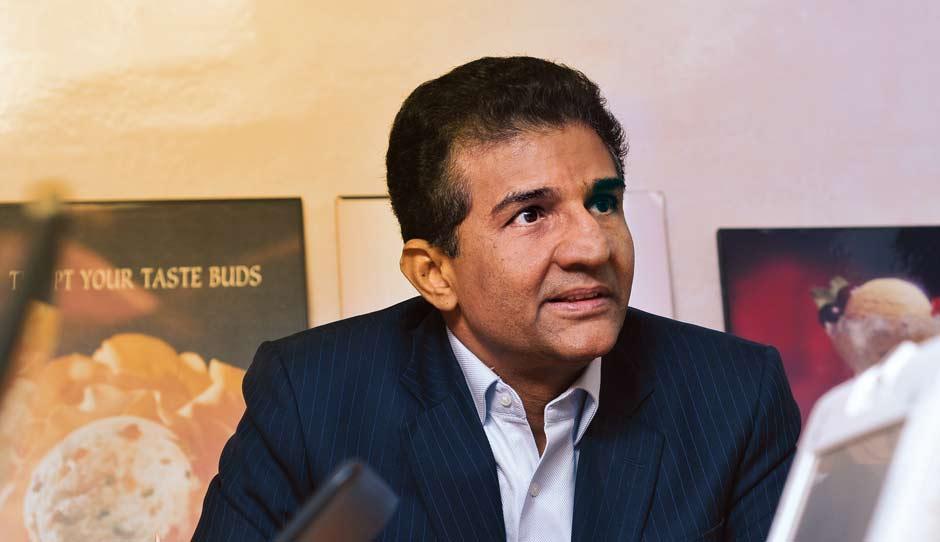How Rajesh Gandhi is Scooping Up Profits for Vadilal
- BY Sonal Khetarpal
 In
In  197791
197791 0
0

In spite of inheriting the Rs8-crore Vadilal business of lip-smacking ice creams in 1979, Rajesh Gandhi did not take things for granted. This fourth generation entrepreneur set on the bandwagon to do things differently. Not only did he put the organisational structure in place, he added another scoop of the processed food business, and placed the company on the international map. With over 1,200 employees and a turnover of Rs430 crore, Ahmedabad-based Vadilal’s 54-year-old managing director, Gandhi spends most of his time in branding, product development and brainstorming, even 33 years since joining the company.
I follow a regular regime of getting up in the morning at 6.30am and exercising for an hour and a half, which includes a long walk and yoga. While working out, I listen to soft, soothing music, and consciously try to keep work-related thoughts at bay. My exercise routine kickstarts the day for me. After having breakfast with my family, I leave for office around 10am. My work day actually begins the moment I step in the car because here I start thinking about the day ahead.
In strong contrast to my fixed exercise routine is my work schedule. No two days are ever the same for me. The first thing I do as I reach office is look at my digital diary for my to-do list, and prioritise my tasks. I make sure I attack my tasks in that order, and try not to keep the to dos pending. After that, the next few hours are usually spent in replying to e-mails, following up with my managers, reviewing reports from various departments and scheduling planning and strategy meetings.
But, it’s after lunch that I get into the most productive part of my day because that is when I have various meetings—on product development, new product lines or basic problem solving. This is the best part of my job—the ideating and the brainstorming. It energises me, and keeps me going. We constantly try to innovate our product portfolio by introducing two or three new products every month, and removing the same number from our product basket. Even though we have more than 150 flavours of ice creams, the widest range in the country, we plan to launch candies and other varieties of ice cream to target children and also focus more on health foods—ice creams with less or no sugar. We are also the only food processing company which offers a variety of frozen regional cuisines and snacks.
In spite of our wide array of products, we had to forgo our number one ice cream brand by sales slot to Amul when it entered the ice cream business in 1996. It marketed its ice creams almost 30-40 per cent cheaper than existing brands, and pushed us to the second slot. We had to arrest that slide, so we went on a marketing and promotion overdrive. We revamped our branding and invested `20 crore in advertising through television, commercials, print media and billboards to target more youth and increase sales from the impulse category.
 For Gandhi, the best way to forge bonds with people, is to go beyond treating them with 'just' respect.
For Gandhi, the best way to forge bonds with people, is to go beyond treating them with 'just' respect. We have also embarked upon increasing the production capacity of our plants, thereby increasing profits by economies of scale. We are upgrading our two manufacturing units, one near Gandhinagar in Gujarat and the other at Bareilly in Uttar Pradesh. In the last two years, we have invested `800 million in our manufacturing facilities and we want to set up another four to five new plants in the next five years. Due to all these efforts, our company has been growing at about 30 per cent annually for the last 10 years and has around 50, 000 retail outlets, 700 distributors and 40 stock points across the country.
In spite of our growth, we are still not at the coveted No. 1 position. By volume of sales, Vadilal with 3,50,000 litres stands next to Amul with 7,00,000 litres. Our market share is 15 per cent as of now and we are trying to scale this up by another 8-10 per cent in the next few years.
To achieve the plans for sustained growth, it is very important for each department to focus and work towards the long term goals of the company. I usually do not get involved in operational issues at all. Yet, in terms of company expansion and decisions on investment, I’m fully engaged and tuned in. In operational matters, I keep a bird’s eye view to see if everything is going okay. But, I believe in delegation, and don’t micromanage—it’s important to give people space to work, empower them and let them take decisions. I encourage people to speak up. When it comes to problem solving, I let others come up with solutions first. I only intervene when I feel the decisions are going against the company policy, or a third party is trying to misuse our situation.
It isn’t sufficient to only supervise though. I put aside considerable time in mentoring and training my people. I do a detailed review of my senior staff’s performance every quarter. I strongly believe that continued, constant communication helps to solve many problems. To forge a bond with people who work for you, you have to go beyond just treating them with respect. I ask after their families, and how they are doing. It’s not unusual for my teams to seek my advice on their children’s educational and matrimonial issues.
The thing that upsets me most is if there has been a misrepresentation of facts. I can’t tolerate that—I appreciate people who own up to their mistakes, and try to rectify them. Which is why when we hire somebody new, we make sure we ascertain a person’s attitude. Capability in itself is not enough. The right approach is much more valuable.
I try and be open-minded myself. It’s important for a manager to be open to criticism, and to keep ego awry. My senior colleagues can freely tell me if they disagree with my decisions, or my way of thinking. I’ve often changed my decision if I am convinced of their logic or reason. I’m aware I’m prone to being stubborn. But, it’s a flaw I don’t let myself forget. I’m conscious of it.
The thing that upsets me most is if there has been a misrepresentation of facts. I can’t tolerate that.
Beyond managing people, when your role is to think strategy for the company, it’s imperative to be aware, and on top of the latest trends in the industry. I spend a lot of time on research to keep myself updated of the trends ongoing in the industry. I visit the market twice a month and randomly talk to retailers about the new products introduced. I attend conferences, seminars and regularly read trade journals and e-newsletters. I share my insights with our R&D centre and plan on indegenising the trends to bring it in our market.
I want to be active in social media too because it is a valuable tool for gathering and interacting directly with consumers. In fact, I created Facebook and Twitter accounts for myself but it’s not something that I’ve been able to make a habit of. Yet, I am actively involved with our customer feedback unit. I monitor the complaints from customers very closely. Our external research agency analyses and determines the magnitude of the complaint which helps us to take corrective measures. I ensure all such steps are being taken and decide on the future course of action. Because we are an FMGC industry, customer satisfaction is the main determinant of our success. Small successes—one happy customer at a time—ensure us of greater success.
Taking care of customer satisfaction, and company’s health is not enough. I take out time for my own too. I ensure I eat five small meals a day and avoid high calorie and unhealthy food. I try to leave office by 8pm so that I can join my family for dinner and spend time with them later in the evening. I never take work home. I would rather stay late and finish all tasks at hand. My father, Ramchandra R. Gandhi, is a strong influence in my life and a lot of my work habits and lifestyle are inspired by him. Around 11.30pm, I call it a day looking forward to another early morning and gearing up for just another busy working day.





























Add new comment